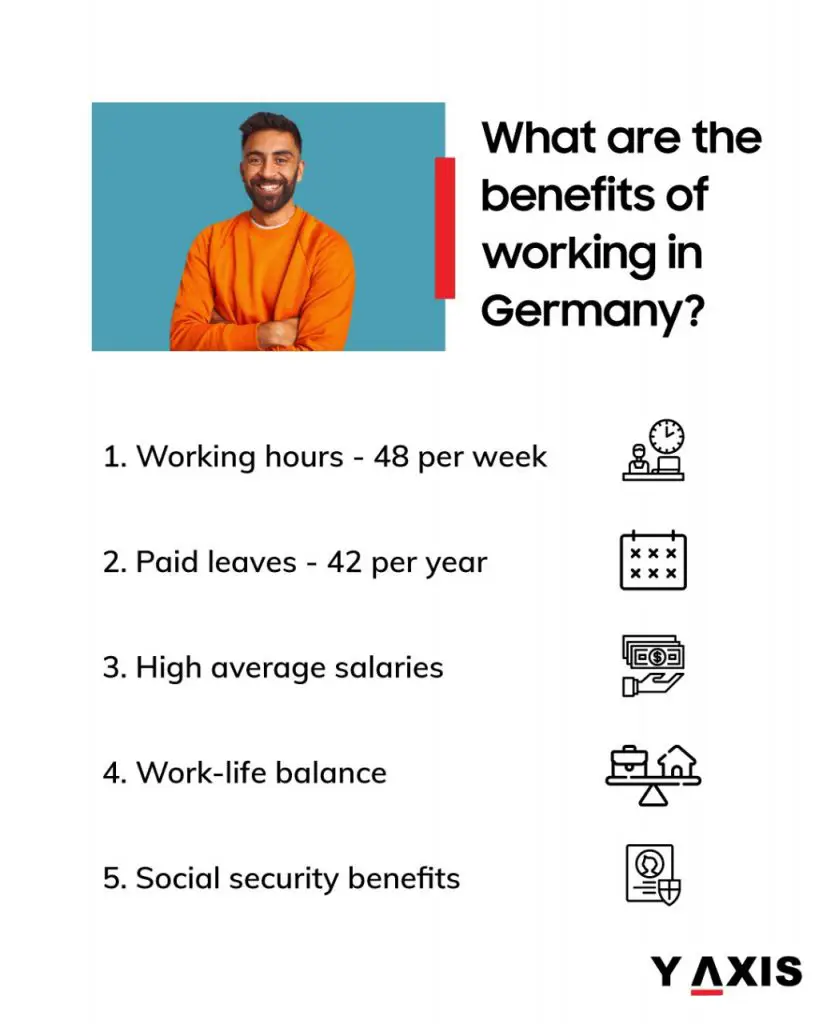Posted on October 18 2021
Work overseas: The benefits you will get if you work in Germany
By , Editor
Updated November 15 2023
Germany is the most developed economy in Europe. So, if you decide to work in Germany, there ought to be many perks associated with it. Let’s discuss the benefits you will get if you work in Germany.
https://www.youtube.com/watch?v=LXwLD86n5Qc
Handsome average salaries
In Germany, the average annual salary paid is around €63,389. The salaries can vary on the basis of region, size of the company, and industry.
The most typical earning is €55,176. Men get an average salary of €66,017 while women get a salary of €53,445.
The highest-paid careers are management and business. These careers feature an average annual income of €85,404. The insurance sector features an average annual income of €80,619.
People with Doctorate Degree get the highest salaries. It comes to €75,987. Those with a Master’s Degree get a salary of €65,222.
People with work experience of over 20 years get a salary of €96,158. Those with 16 to 20 years of work experience get a salary of €95,139.
In comparison with other European countries, the average salary in Germany is quite high. Germany also has a statutory minimum wage offered to workers. This ensures that no worker gets low and unfair wages.
Attractive employee benefits
Competitive salaries are typical of Germany. Workers are entitled to benefits like paid sick days of up to 6 weeks. They also get paid holiday of up to 4 weeks annually besides maternity and parental leave of up a year. The higher rate of income tax you pay in Germany is offset with whatever social benefits the country provides.
Welfare benefits for employees
Companies in Germany are focused on the improvement of their employees. They make an investment in the training of employees, leading to their growth. So, you working in a German company can lead to your overall growth in efficiency and technical skills.
In Germany, no discrimination exists for employees on the basis of gender, age, religion, or race. German companies are committed to paying wages fairly to employees.
Benefits of social security
The social security system in Germany makes sure that its people have a comfortable life even when they are sick, retired, unemployed, or disabled. There are different categories for insurance. Both employees and employers contribute towards the insurance. Medical insurance is compulsory to work in Germany.
Though there’s a high level of taxation, the fact that the government gives many benefits in return justifies it.
If you are a German employee, you will make a contribution of close to 20% of your income. This will go to the key social security funds. Your employer will match the remaining 20%.
The details of sharing of funds are like this:
Pension Fund: Upon reaching the age of 65, you can choose to retire and earn up to 67% of your gross salary before retirement. Even if you move to another country as an expat, your eligibility for your accumulated pension will still stay.
Health insurance: Your employer will enroll you in a public health insurance fund.
Unemployment insurance: Your contribution will go to the unemployment fund during the course of your being employed. This fund will be helpful after registering with the German Labor Office in case you have lost your job. You can then earn a part of your previous salary. The sum of money you get and the time that’s taken to get it will be dependent on your age as well as the tenure you have worked.
Accident & sick pay insurance: It gives you protection in case you become sick at work, or get injured in an accident. It should cover the expenses of medical care and ensures your coverage during your rehabilitation or get a pension in case you become disabled.
Disability insurance: It becomes necessary that you donate to the state’s disability fund while you are employed. It helps disabled people to stay in the workforce or provides them with an income when they can’t function anymore. Naturally disabled people, victims of violent crimes, and wounded war veterans are all given coverage by this fund.
Work-life balance
German companies follow a 5-day workweek. This helps employees to find more time for personal activities and to spend with their families. Employees aren’t expected to work extra hours. Neither are they expected to work during non-office hours.
Easy process to obtain a work permit
Getting a work permit in Germany is now simpler, thanks to the steps taken by the government. These steps were taken to encourage foreign workers. If you are a non-EU citizen you can apply for a German work visa or apply for a Blue Card to work in Germany.
Opportunities for your family
Once you have a work visa and a residence permit, you can bring your family members to Germany. Your family members will get the eligibility to work and study in Germany.
You and your family members will get the eligibility for taking the benefits of social security. These will include insurance and pension benefits.
Germany offers social security benefits, attractive work benefits, a good work-life balance, and a low cost of living.
| Are you eligible to immigrate to Germany? Click here to find out. |
For expert immigration and overseas job search services, contact Y-Axis, the World’s No.1 immigration & visa company. Click here to connect with us.
Read these recent articles:
Guide to work overseas – The highest-paid jobs in Ireland in 2022
Ways open for students from the USA to get Australia PR in 2022
Tags:
Work in Germany
Share

